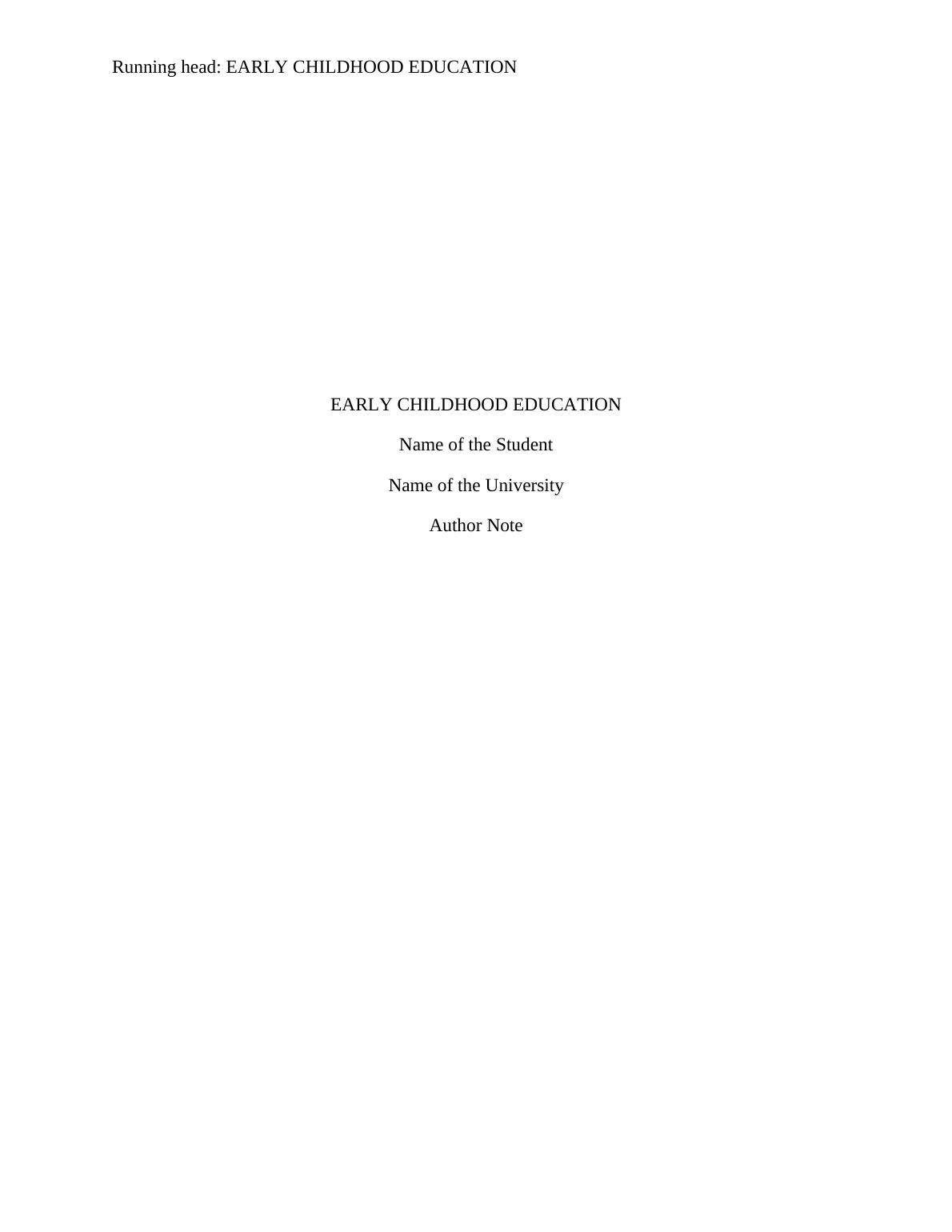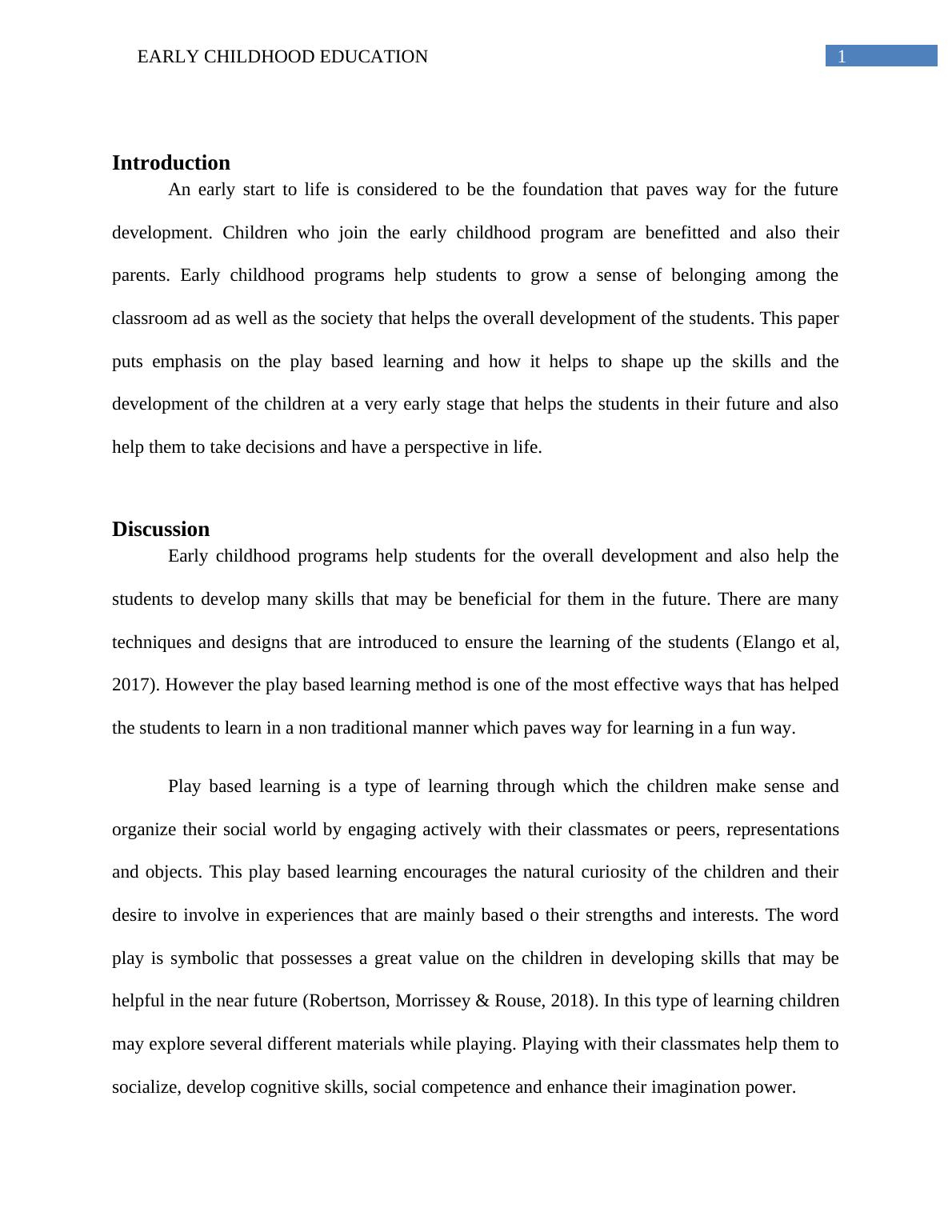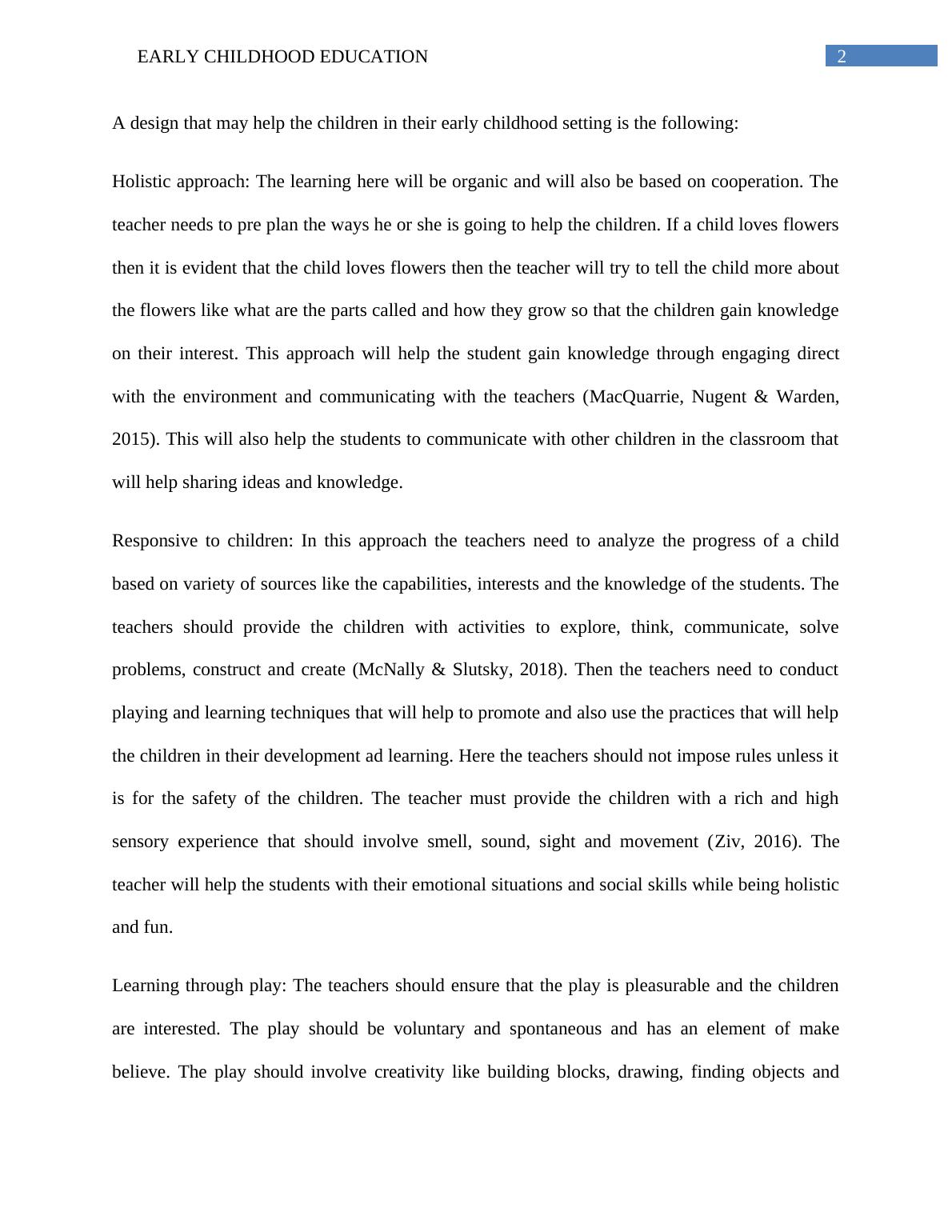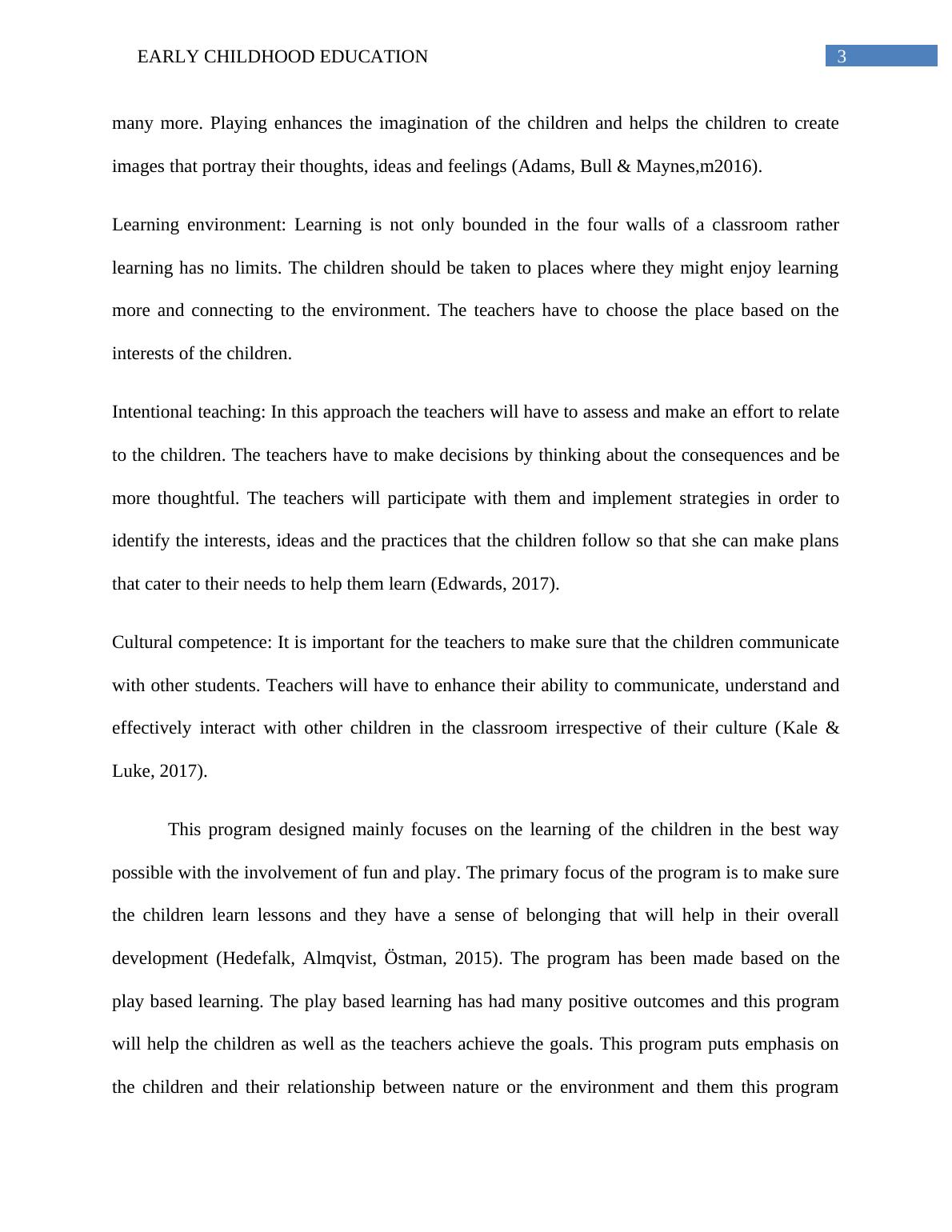Play-Based Learning in Early Childhood Education
Added on 2023-01-24
13 Pages2537 Words51 Views
Running head: EARLY CHILDHOOD EDUCATION
EARLY CHILDHOOD EDUCATION
Name of the Student
Name of the University
Author Note
EARLY CHILDHOOD EDUCATION
Name of the Student
Name of the University
Author Note

1EARLY CHILDHOOD EDUCATION
Introduction
An early start to life is considered to be the foundation that paves way for the future
development. Children who join the early childhood program are benefitted and also their
parents. Early childhood programs help students to grow a sense of belonging among the
classroom ad as well as the society that helps the overall development of the students. This paper
puts emphasis on the play based learning and how it helps to shape up the skills and the
development of the children at a very early stage that helps the students in their future and also
help them to take decisions and have a perspective in life.
Discussion
Early childhood programs help students for the overall development and also help the
students to develop many skills that may be beneficial for them in the future. There are many
techniques and designs that are introduced to ensure the learning of the students (Elango et al,
2017). However the play based learning method is one of the most effective ways that has helped
the students to learn in a non traditional manner which paves way for learning in a fun way.
Play based learning is a type of learning through which the children make sense and
organize their social world by engaging actively with their classmates or peers, representations
and objects. This play based learning encourages the natural curiosity of the children and their
desire to involve in experiences that are mainly based o their strengths and interests. The word
play is symbolic that possesses a great value on the children in developing skills that may be
helpful in the near future (Robertson, Morrissey & Rouse, 2018). In this type of learning children
may explore several different materials while playing. Playing with their classmates help them to
socialize, develop cognitive skills, social competence and enhance their imagination power.
Introduction
An early start to life is considered to be the foundation that paves way for the future
development. Children who join the early childhood program are benefitted and also their
parents. Early childhood programs help students to grow a sense of belonging among the
classroom ad as well as the society that helps the overall development of the students. This paper
puts emphasis on the play based learning and how it helps to shape up the skills and the
development of the children at a very early stage that helps the students in their future and also
help them to take decisions and have a perspective in life.
Discussion
Early childhood programs help students for the overall development and also help the
students to develop many skills that may be beneficial for them in the future. There are many
techniques and designs that are introduced to ensure the learning of the students (Elango et al,
2017). However the play based learning method is one of the most effective ways that has helped
the students to learn in a non traditional manner which paves way for learning in a fun way.
Play based learning is a type of learning through which the children make sense and
organize their social world by engaging actively with their classmates or peers, representations
and objects. This play based learning encourages the natural curiosity of the children and their
desire to involve in experiences that are mainly based o their strengths and interests. The word
play is symbolic that possesses a great value on the children in developing skills that may be
helpful in the near future (Robertson, Morrissey & Rouse, 2018). In this type of learning children
may explore several different materials while playing. Playing with their classmates help them to
socialize, develop cognitive skills, social competence and enhance their imagination power.

2EARLY CHILDHOOD EDUCATION
A design that may help the children in their early childhood setting is the following:
Holistic approach: The learning here will be organic and will also be based on cooperation. The
teacher needs to pre plan the ways he or she is going to help the children. If a child loves flowers
then it is evident that the child loves flowers then the teacher will try to tell the child more about
the flowers like what are the parts called and how they grow so that the children gain knowledge
on their interest. This approach will help the student gain knowledge through engaging direct
with the environment and communicating with the teachers (MacQuarrie, Nugent & Warden,
2015). This will also help the students to communicate with other children in the classroom that
will help sharing ideas and knowledge.
Responsive to children: In this approach the teachers need to analyze the progress of a child
based on variety of sources like the capabilities, interests and the knowledge of the students. The
teachers should provide the children with activities to explore, think, communicate, solve
problems, construct and create (McNally & Slutsky, 2018). Then the teachers need to conduct
playing and learning techniques that will help to promote and also use the practices that will help
the children in their development ad learning. Here the teachers should not impose rules unless it
is for the safety of the children. The teacher must provide the children with a rich and high
sensory experience that should involve smell, sound, sight and movement (Ziv, 2016). The
teacher will help the students with their emotional situations and social skills while being holistic
and fun.
Learning through play: The teachers should ensure that the play is pleasurable and the children
are interested. The play should be voluntary and spontaneous and has an element of make
believe. The play should involve creativity like building blocks, drawing, finding objects and
A design that may help the children in their early childhood setting is the following:
Holistic approach: The learning here will be organic and will also be based on cooperation. The
teacher needs to pre plan the ways he or she is going to help the children. If a child loves flowers
then it is evident that the child loves flowers then the teacher will try to tell the child more about
the flowers like what are the parts called and how they grow so that the children gain knowledge
on their interest. This approach will help the student gain knowledge through engaging direct
with the environment and communicating with the teachers (MacQuarrie, Nugent & Warden,
2015). This will also help the students to communicate with other children in the classroom that
will help sharing ideas and knowledge.
Responsive to children: In this approach the teachers need to analyze the progress of a child
based on variety of sources like the capabilities, interests and the knowledge of the students. The
teachers should provide the children with activities to explore, think, communicate, solve
problems, construct and create (McNally & Slutsky, 2018). Then the teachers need to conduct
playing and learning techniques that will help to promote and also use the practices that will help
the children in their development ad learning. Here the teachers should not impose rules unless it
is for the safety of the children. The teacher must provide the children with a rich and high
sensory experience that should involve smell, sound, sight and movement (Ziv, 2016). The
teacher will help the students with their emotional situations and social skills while being holistic
and fun.
Learning through play: The teachers should ensure that the play is pleasurable and the children
are interested. The play should be voluntary and spontaneous and has an element of make
believe. The play should involve creativity like building blocks, drawing, finding objects and

3EARLY CHILDHOOD EDUCATION
many more. Playing enhances the imagination of the children and helps the children to create
images that portray their thoughts, ideas and feelings (Adams, Bull & Maynes,m2016).
Learning environment: Learning is not only bounded in the four walls of a classroom rather
learning has no limits. The children should be taken to places where they might enjoy learning
more and connecting to the environment. The teachers have to choose the place based on the
interests of the children.
Intentional teaching: In this approach the teachers will have to assess and make an effort to relate
to the children. The teachers have to make decisions by thinking about the consequences and be
more thoughtful. The teachers will participate with them and implement strategies in order to
identify the interests, ideas and the practices that the children follow so that she can make plans
that cater to their needs to help them learn (Edwards, 2017).
Cultural competence: It is important for the teachers to make sure that the children communicate
with other students. Teachers will have to enhance their ability to communicate, understand and
effectively interact with other children in the classroom irrespective of their culture (Kale &
Luke, 2017).
This program designed mainly focuses on the learning of the children in the best way
possible with the involvement of fun and play. The primary focus of the program is to make sure
the children learn lessons and they have a sense of belonging that will help in their overall
development (Hedefalk, Almqvist, Östman, 2015). The program has been made based on the
play based learning. The play based learning has had many positive outcomes and this program
will help the children as well as the teachers achieve the goals. This program puts emphasis on
the children and their relationship between nature or the environment and them this program
many more. Playing enhances the imagination of the children and helps the children to create
images that portray their thoughts, ideas and feelings (Adams, Bull & Maynes,m2016).
Learning environment: Learning is not only bounded in the four walls of a classroom rather
learning has no limits. The children should be taken to places where they might enjoy learning
more and connecting to the environment. The teachers have to choose the place based on the
interests of the children.
Intentional teaching: In this approach the teachers will have to assess and make an effort to relate
to the children. The teachers have to make decisions by thinking about the consequences and be
more thoughtful. The teachers will participate with them and implement strategies in order to
identify the interests, ideas and the practices that the children follow so that she can make plans
that cater to their needs to help them learn (Edwards, 2017).
Cultural competence: It is important for the teachers to make sure that the children communicate
with other students. Teachers will have to enhance their ability to communicate, understand and
effectively interact with other children in the classroom irrespective of their culture (Kale &
Luke, 2017).
This program designed mainly focuses on the learning of the children in the best way
possible with the involvement of fun and play. The primary focus of the program is to make sure
the children learn lessons and they have a sense of belonging that will help in their overall
development (Hedefalk, Almqvist, Östman, 2015). The program has been made based on the
play based learning. The play based learning has had many positive outcomes and this program
will help the children as well as the teachers achieve the goals. This program puts emphasis on
the children and their relationship between nature or the environment and them this program

End of preview
Want to access all the pages? Upload your documents or become a member.
Related Documents
Early Childhood Educationlg...
|8
|1513
|66
Philosophy of Early Childhood Education and Carelg...
|11
|2364
|71
Early Childhood Education and Care Using an integrated curriculum approachlg...
|12
|2755
|348
Music Arts in Childhoodlg...
|5
|1145
|87
Cultural Competency and Ethical Considerations in Early Childhood Educationlg...
|13
|3317
|68
Analysis and Observations based on key principles of Belonginglg...
|10
|2592
|28